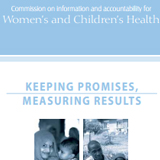
The United Nations Commission on Information and Accountability for Women’s and Children’s Health presented their report, Keeping Promises, Measuring Results, and recommendations to increase the likelihood that pledges for women’s and children’s health are honoured and that resources are spent in the most effective way to save lives. The advance copy of the report was presented at a technical briefing today during the 64th World Health Assembly.
"All partners are accountable for the promises they make and the health policies and programmes they design and implement," says President Jakaya Kikwete, from the United Republic of Tanzania and one of the co-chairs of the Commission. "Tracking resources and results of public health spending are critical for transparency, credibility and ensuring that much-needed funds are used for their intended purposes and to reach those who need them most."
The report’s ten recommendations include:
1. increasing the number of countries with well-developed systems to measure births, deaths and causes of deaths;
2. measuring against 11 common indicators on reproductive, maternal and child health;
3. helping countries integrate the use of Information and Communication Technologies in their national health information systems;
4. countries with high maternal and child deaths track and report resource indicators;
5. country governments and major development partners put "compacts" in place that require reporting, based on country format, on externally funded expenditures and predictable commitments;
6. all governments have the capacity to regularly review health spending and to relate spending to commitments;
7. countries have established national accountability mechanisms that are transparent, inclusive of stakeholders and recommend action as necessary;
8. all stakeholders are publicly sharing information on commitments, resources provided and results achieved annually at both national and international levels;
9. the Organisation for Economic Co-operation and Development’s Development Assistance Committee (OECD-DAC) agree on how to better capture all reproductive, maternal, newborn and child health spending by development partners;
10. an independent Expert Review Group is reporting regularly to the UN Secretary-General on results and resources related to the Global Strategy for Women’s and Children’s Health and progress of the implementation of these recommendations.
“The Commission has developed bold yet practical measures that will help save the lives of mothers and children living in the world’s poorest countries," says Prime Minister Stephen Harper from Canada, the other co-chair of the Commission. "Through our collective efforts we will ensure tangible progress in achieving our goals, but only if we remain fully committed to making the recommendations in this report a reality."
The accountability framework proposed by the Commission will:
- Track results and resource flows at global and country levels;
- Identify a core set of indicators and measurement needs for women’s and children’s health;
- Propose steps to improve health information and registration of vital events – births and deaths – in low-income countries;
- Explore opportunities for innovation in information technology to improve access to reliable information on resources and outcomes.
- Download the report (pdf)
- Read the press release
- Report also available in French, Spanish, Russian, Chinese and Arabic.